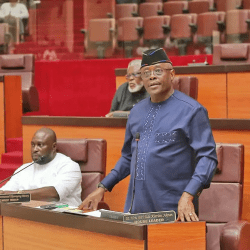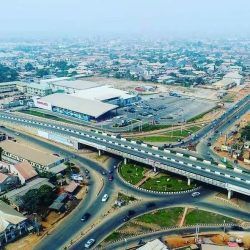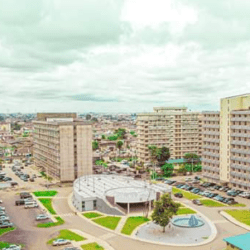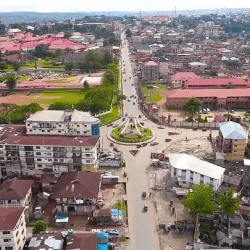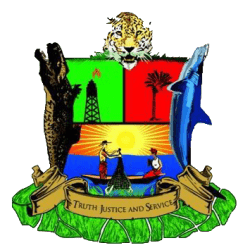Principal Officers of Akwa Ibom State House of Assembly

RT. HON. ANIEKAN ETIM BASSEY
THE SPEAKER
The presides over the affairs of the House and guides the proceedings as an unbiased umpire. Among other things, he preserves the Standing Orders and Rules of the House, controls the House as stipulated in the Rules of debate, interprets the Rules, receives all communications addressed to the House and in conjunction with the Selection Committee, chooses members of the Standing Committees of the House and appoints Chairmen of the Committees.

RT. HON. PRINCESS FELICIA BASSEY
THE DEPUTY SPEAKER
The Deputy Speaker assists the Speaker and performs the duties and functions of the Speaker in the absence of the Speaker.

HON. SIR UDO KIERIAN AKPAN
THE LEADER OF THE HOUSE
He is a ranking member nominated from amongst the members belonging to the party with the majority seat. He leads the business of the House, manages the Legislative Business of the House, and liaises with Chairmen of the House Committees and other functionaries of the House. He also Chairs the Committee on Business, Rules and Standing Orders; Chairs the Parliamentary Caucus Meetings of the party in the House.

HON. EMMANUEL EKPENYONG BASSEY
CHIEF WHIP
Functions of the Chief Whip include assisting the Leaders of the House in the performance of his functions, liaising with Chairmen of Committees and functionaries of the House on behalf of the party. He also notifies the Speaker to enforce the Rules relating to Ethics, Privileges, as well as Rules of Debate.

HON. ANIEFIOK DENNIS AKPAN
DEPUTY LEADER OF THE HOUSE
Functions of the Chief Whip include assisting the Leaders of the House in the performance of his functions, liaising with Chairmen of Committees and functionaries of the House on behalf of the party. He also notifies the Speaker to enforce the Rules relating to Ethics, Privileges, as well as Rules of Debate.

HON. NSE ESSIEN
DEPUTY CHIEF WHIP
He performs all the duties of the Chief Whip in his absence and serves as parliamentary secretary during Executive Sessions of Members of the House.

MRS. NSIKAKABASI OROK
THE CLERK OF THE HOUSE
The Clerk to the House of Assembly is the Chief Administrative and Accounting Officer. As a Civil Servant, she provides both administrative and legislative advice to all Honourable Members of the Assembly.
Reference: hoa.akwaibomstate.gov.ng/
Akwa Ibom State House of Assembly
Akwa Ibom State House of Assembly is the state legislature of Akwa Ibom in Nigeria.
Its office complex is located at Udo Udoma Avenue, Uyo.

There are 26 Honourable Members representing 26 State Constituencies.

There have been seven different Assemblies.
The first Assembly was inaugurated on the 20th day of January 1992 with Obong Jimmy Jimmy Ntuen as Speaker. Other succeeding Speakers for the 1st and 2nd Assemblies were Barr. Nse Ekanem, Barr. Henry Afang, Barr. Bassey Essien, Chief Peter Linus Umoh.

While Chief Nelson Efiong served as Speaker of the 3rd Assembly), Obong (Engr.) Ignatius Kelvin Edet and Obong Anietie Etuk served as Speakers in the 4th Assembly. The 5th Assembly had Elder Samuel Ikon as its Speaker and Barr. Onofiok Akpan Luke as the Speaker of the 6th Assembly.

The 7th Assembly was inaugurated on June 10, 2019 with Rt. Hon. Aniekan Etim Bassey as the Speaker. It has 14 returning Members and 11 new Members. On December 2, 2019, the Speaker swore in Chief Effiong Johnson (of the APC) as the member representing Mbo State Constituency having been declared the winner in the 2019 Mbo State Constituency Election by the Court of Appeal to replace the initial presumed winner, Hon. Okon Frank (of the PDP).
On the 11th day of February 2020, Barr. Esse Umoh (of the PDP), who was also undergoing litigations arising from his victory at the elections, was sworn in to represent Essien Udim State Constituency.
Reference: akwaibomstate.gov.ng/about-the-house/
Akwa Ibom
Akwa Ibom is a state in the South-South geopolitical zone of Nigeria, bordered by Cross River, Rivers, Abia, Ebonyi states and the Atlantic Ocean.



It was created in 1987 from Cross River State and has 31 local government areas.
It has a population of about 5.5 million people as of 2016 and is the 15th most populous state in Nigeria.
The state is rich in natural resources such as oil, gas, clay, limestone, salt, and coal.
Akwa Ibom is also known for its cultural diversity and language similarities. There are over 20 languages spoken in Akwa Ibom, but the major ones are Ibibio, Anaang, Efik, and Igbo.
Akwa Ibom takes its name from the Qua Iboe River which bisects Akwa Ibom before flowing into the Bight of Bonny.
Akwa Ibom has a tropical climate with two seasons: rainy and dry. The rainy season lasts from April to October and the dry season from November to March.
It is home to various tourist attractions such as the Ibom Plaza, the Ibeno Beach, the Stubb’s Creek Forest Reserve, the National Museum of Colonial History, and the Meridien Akwa Ibom golf course.
Akwa Ibom has a vibrant culture and celebrates various festivals such as the New Yam Festival, the Ekpe Masquerade Festival, the Leboku Festival, and the Christmas Carols Festival.
Located in the South Eastern part of the country, Akwa Ibom is a key member of Nigeria’s South South Zone, rich in crude oil, natural gas and a diversity of agricultural produce.



Over 5000 expatriates working for various organisations like Exxon Mobil, Shell, Chevron, Elf, the Aluminum Smelter Company, ALSCON, Forrestal, Reynold International and the University of Uyo have found a home here.


Capital City: Uyo
Other Major Cities: Eket, Ikot Ekpene, Abak, Ikot Abasi and Oron.
Ethnic Groups: Multi-ethnic: Ibibio, Anang, Oron, Eket, Ibeno, Mbo
Location: Latitude 4o 32’ and 5o53’ North and Longitude 7o25’ and 8o25 East.
Area: 8,412 square kilometers



Climate: Tropical climate marked by two distinct seasons; the dry season (November – March) and the wet season (April – October). The wet season is usually interrupted by a short dry spell in August.
Mean annual rainfall is 2,200mm in the north of the state and 3,500mm in the south of the state.
Sunshine is between 1,400 to 1,500 hours per year. Average temperature range from 23oC to 31oC.
Vegetation: Three easily distinguishable vegetation; the saline water swamp forest, the fresh water swamp forest and the rainforest.
Mineral Resources: Crude oil, natural gas, limestone, gold, salt, coal, silver nitrate, glass sand, kaolin.
The major industrial crop is the oil palm tree. The Akwa Ibom has the densest groves of oil palm in Nigeria. The Akwa Palm Industries PLC was set up in 1991 to harness the full potential of this crop.

The production of crude palm oil will allow for downstream industries which can refine the oil into vegetable oil, soaps, margarine, glycerin, candles, detergents and numerous other products. The kernel oil is used for the manufacture of high quality toilet soap. Bye product from the oil palm industries are used for the production of livestock feeds.
Arable Crops
Cassava
Yam
Cocoyam
Maize
Rice
Cowpea
Melon
Horticultural or Fruit Crops
Plantain
Banana
Pineapple
Pawpaw
Mango
African peas
Vegetable Crops
Leafy vegetable
Okro
Pepper
Tomatoes
Cash Crops
Oil palm
Coconut
Rubber
Cocoa
Raffia palm
Gmelina
Kola
Although Akwa Ibom is mineral-rich, agriculture is the bedrock of its economy. It employs about 70 percent of the state’s workforce. Most are engaged in subsistent farming. The industrial sector is small and is dominated by government owned companies. The private sector is active in the service areas, although a few industries are privately owned.
At inception, the state inherited a number of companies from Cross River State. These are:
- Sunshine Batteries, Essien Udim
- Peacock Paint, Etinam
- Quality Ceramic Industries, Itu
- Qua Steal Products Limited, Eket
- Asbestonit Industries, Oron
- Plasto – Crown Industries, Uyo
- International Biscuits Limited, Ikot Ekpene
- Champion Breweries, Uyo
- Pamil Industries, Abak

Most of the companies are ailing, becoming a drain on government. As part of the economic policies, these companies are to be revived and privatized. Government is diverting its interest in them in line with overall philosophy to focus on creating an enabling environment for private sector initiatives to flourish.
LGAs in Akwa Ibom State
The LGAs (Local Government Areas) in Akwa Ibom State are:
- Abak
- Eastern Obolo
- Eket
- Esit Eket
- Essien Udim
- Etim Ekpo
- Etinan
- Ibeno
- Ibesikpo Asutan
- Ibiono Ibom
- Ika
- Ikono
- Ikot Abasi
- Ikot Ekpene
- Ini
- Itu
- Mbo
- Mkpat Enin
- Nsit Atai
- Nsit Ibom
- Nsit Ubium
- Obot Akara
- Okobo
- Onna
- Oron
- Oruk Anam
- Udung Uko
- Ukanafun
- Uruan
- Urue-Offong/Oruko
- Uyo


